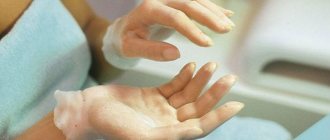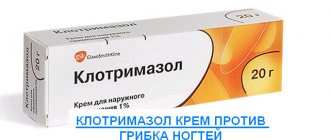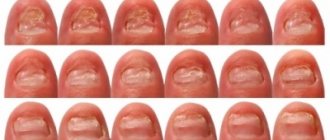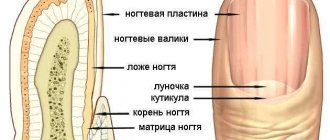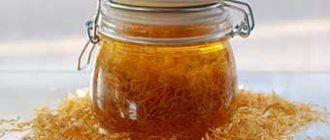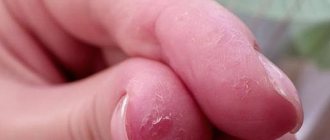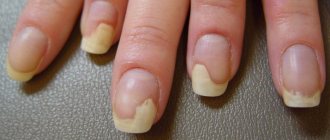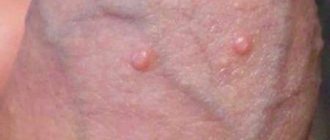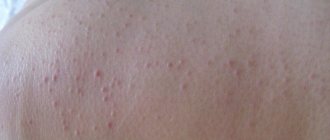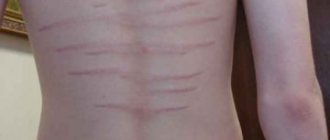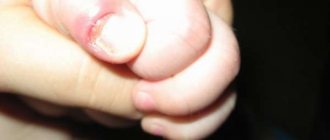The condition of the fingertips is directly related to the health of the body, since the sensitive skin of the hands contains a large number of nerve endings. Because of this, pathologies and organ dysfunction can lead to a deterioration in the condition of a natural manicure.
To prevent complications and side effects, if your nails turn yellow, you should consult a doctor immediately. This way you will ensure quick recovery of the nails using simple plate rehabilitation methods.
Causes of yellow nails that are not related to diseases
The nail plate can change its natural color as a result of the influence of certain external factors. These include:
- contact with household chemicals;
- long exposure to the sun, which causes the negative effects of ultraviolet rays;
- use of low-quality creams or decorative varnishes;
- smoking; Resins and nicotine will constantly accumulate in the nails, which will eventually turn the nails yellow.
All these reasons can cause a change in nail color. To eliminate an external defect, you will need to spend a lot of time and effort.
The main reasons for changing nail color
Yellow fingernails (causes include chemical exposure) may indicate pathology or be related to physiology. The symptom occurs due to exposure to external or internal factors.
External factors
External influences that can lead to the appearance of a symptom:
- Failure to follow the rules during manicure. The most common reason is that it leads to a yellowish color of the nails. Varnish consists of many harmful components. For example, nitrocellulose, formaldehyde (formalin resin). Products containing dibutyl phthalate should be avoided because the component often causes malignancy. Additionally, it is not recommended to purchase varnishes with toluene; after application, it affects the liver. If you constantly use a manicure remover that is based on acetone, the plate may turn yellow. Therefore, you need to periodically give your nails a break from manicure. And before applying colored varnish, you should coat the plate with a transparent protective agent.
- The influence of household chemicals. Nails turn yellow if a person washes dishes, bathtubs and other objects without using rubber gloves. To do housework, you should purchase this device. Almost all products that have detergent and cleaning properties get on the skin and plate, washing out useful substances. As a result, the nail will be fragile and weak. And the skin is dry.
- Exposure to ultraviolet radiation. Changes in the color of the plate may occur as a result of exposure to sunlight. The symptom is also noticed after visiting a solarium.
- Effect of components of cigarette smoke. When the nail is exposed to nicotine and tar, it can change its color. Additionally, the negative impact extends to varnish, gel or skin. For example, if a person constantly holds a cigarette in only one hand, then the nails on it will be yellow. And the other upper limb is distinguished by the usual color of the plate.
- The influence of chemical compounds. This paragraph does not apply to household chemicals. People often notice yellowing of the plate after peeling carrots or home canning.
- Traumatization, which leads to a change in the color of the plate.
- Prolonged and uncontrolled use of certain groups of medications. For example, antibiotics and others.
- Abuse of tea or coffee. Drinks contain pigment, which can cause nails to turn yellow.
- Cleaning or collecting walnuts that have green shells. If the amount of product is small, the plate may turn yellow. And when exposed to a large volume - to a black-brown color.
As a treatment, you simply need to exclude the listed factors. For example, smoking, cleaning without gloves. In order not to wait for the nail to renew itself (from 96 to 115 days), you can speed up the process using traditional methods or medications.
Internal factors
Yellow fingernails (causes include exposure to ultraviolet rays) may be due to internal factors.
They are listed in the table:
| Name | Description |
| Lack of nutrients | This concerns a lack of vitamins. Deficiency of nutrients is not a rare occurrence. As a result, the color of your nails may change. |
| Elderly age | Changes in color, thickness, and shape of the plate are a natural phenomenon in old age. |
| Weakened immune system | As a result, the body's functioning is disrupted. The color of the nails may also change. |
| Onychogryphosis | A pathology in which the color and shape of the nail changes. The plates twist and bend; this position is unnatural for them. Most often, the disease is diagnosed on the lower extremities, but it can also occur on the arms. Causes of the condition:
Symptoms depend on the stage of the disease. Namely:
|
| Onychodystrophy | The disease is characterized by deformation or softening of the corneal and nail surface under the influence of certain factors. Causes of pathology:
Symptoms of the disease:
|
| Psoriasis | A common skin disease. Sometimes the manifestation of pathology is not typical. For example, damage to the nails. Symptoms:
|
| Fungus | If the color of the nail has changed to yellowish, it is possible that it is a fungus. The disease is otherwise called onychomycosis. Causes of the condition:
Usually the disease first affects the little fingers, and less often the hands. Symptoms depend on the classification of onychomycosis:
|
| Stressful situations | Under severe stress, a person loses his appetite. As a result, an insufficient amount of vitamins is supplied. |
| Poor nutrition | The cause of development is similar to stress – a lack of nutrients. |
The nails on the hands may turn yellow for various reasons, and the color also changes under the plate. There is a possibility that the symptom indicates a pathology.
Detailed information is listed in the table:
| Name | Description |
| Jaundice | The disease is characterized by icteric staining of the skin and mucous membranes. That is, the level of bilirubin is increased. Causes:
Symptoms include drowsiness, nausea, and a bitter taste in the mouth. Additionally, there is a lack of appetite, the color of natural fluids (stool, urine) changes. |
| Diseases of the renal system | Yellowing under the nails is rare. The most noticeable symptoms are:
|
| Lung pathologies | This item may include chronic bronchitis, malignant tumors in the lungs and other pathologies. Symptoms: lack of oxygen, increased breathing, bluish lips. |
| Diabetes | In addition to yellow nails, pathology can be judged by the appearance of the following symptoms:
|
| Hypothyroidism | This is reduced functionality of the thyroid gland. Symptoms:
|
| Vascular pathologies | The disease can be judged by the appearance of the following symptoms:
|
| Acromegaly | Bones no longer develop. The blood contains an increased amount of growth hormone. Symptoms include:
|
Disease-related causes of yellow nails
In addition to negative external factors, some diseases affect the change in the color of the nail plate. Among them:
- Liver diseases. When they appear, a person’s bilirubin level increases.
- Diseases associated with the respiratory system. Yellow nails can become a symptom of bronchitis becoming chronic, as well as the appearance of cancer.
- Disturbances in the endocrine system, as well as with weakened immunity.
- Jaundice. This disease almost always provokes a change in nail color.
- Fungus. In addition to yellowness, a person may notice that the nail plate has become noticeably thicker and may also have changed its structure.
- Onychogryphosis. This disease can be congenital or acquired. The main symptoms are: thickening of the nail, yellowness; the appearance of a claw-like shape.
- Diseases of an infectious nature. These include pneumonia, rubella, measles, dysentery, scarlet fever, and syphilis.
- Stress and nervous disorders.
- Psoriasis.
- Dystrophy of the nail plate.
One of the common causes of yellowing of nails is a fungal infection.
In addition, the cause of yellowness on the nails can be a long course of antibiotics that were prescribed by the attending physician for the treatment of diseases of a certain type.
Treatment and whitening of nails at home
Folk remedies can be used for yellowing fingernails. Compared to medications, herbal recipes have a low likelihood of causing side effects.
Popular folk remedies:
- Lemon juice . This method is popular and is often used for whitening. Just squeeze out the juice and rub it into your fingers. You need to repeat the application 2 – 3 times a day.
- Bath with sea salt . Using this recipe you can reduce the yellowing of the plate. To prepare the product, you need to take 1 liter of warm water and 1 tbsp. l. sea salt. Additionally, you should add 1 – 2 drops of any essential oil. Lemon, eucalyptus, and lavender are best suited. Immerse your hands in the liquid for 15 minutes. Rinse limbs with water and dry. To improve the effect, you can lubricate your hands with moisturizer.
- Mask. For whitening, you need to take grapefruit seed extract, olive or sunflower oil. The first component can be purchased at the pharmacy chain. To prepare, you need to take 1 tbsp. l. oil and 5 drops of grapefruit seeds. Mix everything thoroughly and apply to nails up to 4 times a day.
Methods for eliminating yellowness on nails
The first thing a person should do when they discover yellowness on their nails is to visit a qualified specialist. Only a doctor will be able to correctly determine the cause that provoked the modification of the nail, as well as select the optimal course of treatment. If you don’t do this, but simply try to hide the defect with a manicure, then after a short period of time the problem will make itself felt again.
If the yellowness on the nails does not appear as a result of internal problems or diseases of the body, then an integrated approach should still be used to eliminate it.
It must include the following steps:
- Going to a beauty salon. Here, experienced craftsmen will help you properly deal with the visual defect.
- Changing nutrition principles. The diet should consist of proper and balanced dishes.
- Replenishment of the level of vitamins and minerals necessary for the body.
- Maintain personal hygiene, which necessarily includes careful hand care.
- Eliminate all low-quality cosmetics, as well as decorative varnishes.
- Give your nails a chance to rest. They have a porous structure. Therefore, you cannot constantly apply decorative varnishes to the surface of the nail plate. It is recommended to take short breaks every 5 days. At this time, you can make healing and restorative hand masks or baths.
If yellowness on the nails begins to appear, then measures should be taken immediately. Treatment can consist of pharmaceuticals or home recipes, which have long proven themselves to be exclusively positive.
Pharmaceutical preparations for yellow spots on nails
Regardless of the reasons that provoked the appearance of yellowness on the nails, you should not self-medicate. It is better to immediately contact a qualified specialist to know exactly what caused this cosmetic defect.
Today there are a large number of different products that can be easily purchased at every pharmacy. The dosage of medications, as well as the period of administration, is prescribed individually for each individual person. The doctor must take into account the cause that led to such consequences and the extent of the nail damage.
Whitening nails at home: effective recipes
In combination with pharmaceutical products, you can use effective home remedies. Their main advantage is the complete absence of contraindications. The only exception is individual intolerance or allergy to the components of the recipe. Home remedies will quickly remove the yellowness of the nail plate and also improve the condition of the skin on your hands. There are several main directions that are used in folk recipes:
- Salt baths. It is a simple and affordable option for everyone. You don't have to buy any special or expensive ingredients. To prepare a salt bath you will need sea or regular salt (in the first case, the composition contains much more nutrients and minerals), 1 glass of warm water, 9-11 drops of tea tree oil. If you don’t have it at home, you can take regular sunflower oil, which every housewife has. To prepare a salt bath, you need to mix all the ingredients in a deep bowl. Then dip your clean hands into it and leave for 10 minutes so that all the beneficial microelements penetrate deep into the skin and nails. After the procedure is over, you should not wash off the remnants of the therapeutic bath. Its components will continue to have their positive effect.
- Berry bath. It will help nourish the nail plate, as well as the skin of the hands around it, with the necessary nutrients. After the procedure, your nails will regain their natural shine and strength. To prepare it you will need: berries that are typical for a given period of time, 1 glass of mineral water. First of all, you need to make a puree from fresh berries. After this, add mineral water to the resulting slurry. Everything is thoroughly mixed. When the berry bath is ready, put your hands in it for 15 minutes. Upon completion of the procedure, they should be rinsed with water and lubricated with cream.
- Fruit acids. They will help to quickly whiten the nail plate due to the vitamin C present in the composition. The use of this method guarantees a positive result only with long-term use.
- Lemon. It needs to be cut into small pieces. Each slice is applied to the nail plate and left for 5 to 8 minutes. This procedure is done with each finger.
- Grapefruit. Take ½ of the fruit and make a puree from it, which can be diluted with a small amount of water. Apply the resulting paste to your nails and leave for 10 minutes. After that, the remnants of the fruit mask are washed off with water, and the plate is wiped with olive oil.
Drug treatment
If the cause is nail fungus
To get rid of fungal nail infections, use special fungicidal varnishes and liquid products intended for treating the nail plate:
- Batrafen varnish, which contains ciclopirox, which fights fungus;
- varnish Loceryl (active ingredient – amorolfine);
- Demicten varnish (attention: it contains poisonous formic aldehyde, but it does not pose a danger for local, limited use);
- medicinal liquid Exoderil (active ingredient - naftifine).
Which product should you choose and which one is more effective in fighting fungus? It should be remembered that all appointments are made by the doctor. And the patient’s task is to use the drug, following the instructions, and adhere to the recommendations regarding secondary prevention. It is necessary to be patient (the treatment is long!) and not to skip treatment procedures. Only in this case will victory over the fungus be guaranteed.
If the cause is common diseases
If a person’s fingernails have turned yellow due to the presence of some internal disease, it is recommended to undergo an examination and consult with a therapist, dermatologist, infectious disease specialist, or endocrinologist. After receiving the test results, the doctor will prescribe a course of treatment.
Advice: do not mask the yellowness of the nail plates. Colored varnishes can only aggravate the problem. In this case, correctly prescribed therapy for the underlying disease will help.
Ways to prevent yellow spots on fingernails
On the one hand, yellow nails are a cosmetic defect that will always be noticeable. But, on the other hand, they can become a signal of more serious and dangerous diseases, as well as malfunctions in the body. Therefore, it is very important to respond to this problem in a timely manner, and it is better to prevent its occurrence.
To do this, all people, without exception, regardless of gender and age, need to monitor their own nutrition. It is better to eat more fruits and vegetables, and include olive oil in your diet. You also need to eat porridge, whole grain bread, meat and liver.
It is very important to follow the rules of personal hygiene and not use low-quality cosmetics, which can cause not only yellowness on the nails, but also cause the development of allergies.
Video: Why does the nail plate turn yellow and thicken?
In the next video, experts will look at why the patient’s nail plate on her big toe has thickened and what to do:
Yellowed nails are a fairly common phenomenon, especially among women. This is no coincidence, because they are the ones who have to perform many different types of work, coming into contact with different substances, which in some cases negatively affect the condition of the nails, if they do not wear protective equipment - gloves. You cannot remain indifferent to this phenomenon, but you should immediately seek help from a dermatologist and other specialists upon detection.
